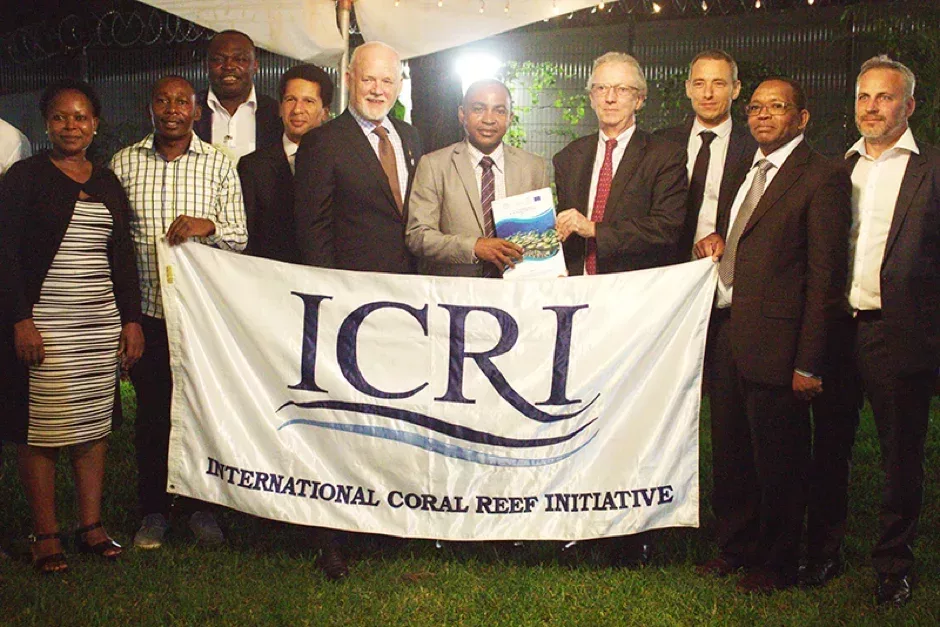Ebène, 8 December 2017 – The first report on the state of coral reefs of all countries of the Western Indian Ocean (WIO) was officially presented yesterday (7 December) in Nairobi, Kenya, during the 32nd General Assembly of the International Coral Reef Initiative (ICRI).
Recognizing the important socio-economic and ecological values of coral reefs and their associated ecosystems, the WIO countries (South Africa, Comoros, France / Réunion, Kenya, Madagascar, Mauritius, Mozambique, Seychelles, and Tanzania), through regional cooperation frameworks (Indian Ocean Commission, Nairobi Convention), have aligned themselves with the International Coral Reef Initiative (ICRI) in an attempt to provide solutions to help manage and maintain these systems, including a regional framework for monitoring and reporting the coral reef status through the Global Coral Monitoring Network (GCRMN).
“This is both a good scientific analysis of coral reef health status trends and an excellent proposal of recommendations for the management of associated reefs and ecosystems,” said Dr Judith Nyunja, Senior Research Scientist at Kenya Wildlife Service (KWS). She added that “the situation is relatively stable after the bleaching of 1998 with losses of 25%, compared with only 10% after the bleaching of 2016, this gives hope for reef preservation if very active management measures are taken”.
Mauritian reefs among the most affected
This report, produced through the IOC-EU Biodiversity Program, presents the latest compilation and quantitative assessment of coral reef health data by regional monitoring networks in WIO, building on previous GCRMN reports published from 1999 to 2008.
“It is a source of pride for the IOC to publish this report, which has been produced with the scientific coordination of CORDIO-EAST Africa, the valuable contributions of national and regional institutions and NGOs as well as individuals who are passionate about reef conservation” underlined Mr Said Ahamada, from the IOC Biodiversity program.
“I encourage the partners to continue supporting the regional reef network/Task force, whose dynamism and motivation is well recognized despite the challenges” he added.
The purpose of this publication is to provide updated information on the state of coral reefs in the region, including impacts of one of the largest coral bleaching events in 2016.
This report explains, among other things, the regional drivers of change and how they are evolving to help countries in coral reef impact planning and recovery.
The results indicate that more than one third of the sites were severely affected by bleaching with a peak between April and May 2016. In the region, Seychelles was most affected by this phenomenon, followed by Tanzania and Mauritius.
To go further
The Biodiversity Program, implemented by the IOC and funded by the European Union, supports several regional initiatives in the management of our reefs. These focus on strengthening national and regional capacities to monitor coral bleaching, identifying coral diseases, eradication Corn of thorn (COTS) and assessing post-bleaching impacts in Comoros, Kenya, Madagascar, Mauritius, Seychelles and Tanzania / Zanzibar. By looking after their reefs for almost 20 years, the countries of the WIO region are contributing towards the achievement of the United Nations Sustainable Development Goal (SDG) No. 14 and the Aichi Target 10&11 of the World Heritage Convention Biodiversity (CBD). The former promotes the conservation and sustainable use of oceans and seas for sustainable development, while the latter states that anthropogenic pressures on coral reef and associated ecosystems are minimized and 10% of marine protected areas worldwide are managed effectively by 2020.
Press contact: IOC Communication unity: [email protected] / Telephone: (+230) 402 61 00
For more information about this event:
- Technical manager of the project: Said Ahamada – [email protected]
- Communication assistant of the project: Mihary Randrianarivelo – [email protected]
